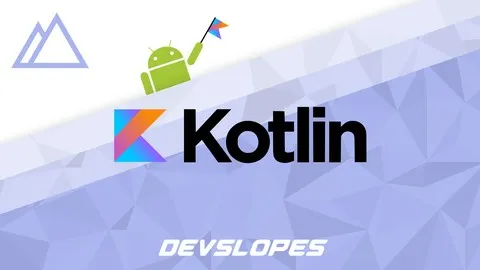
Learn Android Application Development 
This beginner course provides an introduction to Android Application Development, teaching the fundamentals of creating Android apps. Participants will gain the skills necessary to build their own Android applications. ▼
ADVERTISEMENT
Course Feature
![]() Cost:
Cost:
Free
![]() Provider:
Provider:
Udemy
![]() Certificate:
Certificate:
No Information
![]() Language:
Language:
English
![]() Start Date:
Start Date:
On-Demand
Course Overview
❗The content presented here is sourced directly from Udemy platform. For comprehensive course details, including enrollment information, simply click on the 'Go to class' link on our website.
Updated in [March 06th, 2023]
This course, Learn Android Application Development, is designed for beginners who want to learn the basics of Android Application development. Students will gain an extensive overview of the Java programming language, install Android Studio and set up the environment, debug an Android Application, create a signed APK file to submit to the Google Play Store, use explicit and implicit intents, make use of fragments, create a custom list view, create the Android Actionbar, create a custom Toast, use Shared Preferences, Files and SQLite, use the AsyncTask class, handle Android 6 Permissions, save data in an online database (MBAAS - Backendless) and do user management. By the end of the course, students will have more than just basic knowledge of Android Application Development.
[Applications]
After completing this course, students will be able to apply their knowledge of Android Application Development to create their own applications. They will be able to debug their applications, create a signed APK file to submit to the Google Play Store, use explicit and implicit intents, create custom List Views, Actionbars, Toasts, and use Shared Preferences, Files, and SQLite. Additionally, they will be able to save data in an online database (MBAAS - Backendless) and do user management.
[Career Paths]
1. Android Application Developer: Android Application Developers are responsible for designing, developing, and testing mobile applications for Android devices. They must have a strong understanding of the Android platform and be able to create applications that are user-friendly and perform well. Developing trends for this job position include the use of artificial intelligence, machine learning, and augmented reality to create more engaging and interactive applications.
2. Android Software Engineer: Android Software Engineers are responsible for developing, testing, and maintaining software applications for Android devices. They must have a strong understanding of the Android platform and be able to create applications that are efficient and perform well. Developing trends for this job position include the use of cloud computing, big data, and blockchain technology to create more secure and reliable applications.
3. Android UX/UI Designer: Android UX/UI Designers are responsible for creating user-friendly and visually appealing interfaces for Android applications. They must have a strong understanding of the Android platform and be able to create applications that are intuitive and visually appealing. Developing trends for this job position include the use of motion design, voice user interfaces, and virtual reality to create more immersive and engaging user experiences.
4. Android Security Engineer: Android Security Engineers are responsible for ensuring the security of Android applications. They must have a strong understanding of the Android platform and be able to create applications that are secure and reliable. Developing trends for this job position include the use of encryption, authentication, and authorization technologies to create more secure applications.
[Education Paths]
Recommended Degree Paths:
1. Bachelor of Science in Computer Science: This degree program provides students with a comprehensive understanding of computer science fundamentals, including programming, software engineering, and computer architecture. It also covers topics such as artificial intelligence, computer networks, and database systems. This degree is ideal for those interested in developing Android applications, as it provides a strong foundation in the fundamentals of computer science.
2. Master of Science in Mobile Computing: This degree program focuses on the development of mobile applications, including Android applications. It covers topics such as mobile application development, mobile security, and mobile user experience. This degree is ideal for those interested in developing Android applications, as it provides a comprehensive understanding of the mobile computing landscape.
3. Bachelor of Science in Software Engineering: This degree program provides students with a comprehensive understanding of software engineering fundamentals, including software design, software development, and software testing. It also covers topics such as software architecture, software project management, and software quality assurance. This degree is ideal for those interested in developing Android applications, as it provides a strong foundation in the fundamentals of software engineering.
4. Master of Science in Artificial Intelligence: This degree program focuses on the development of artificial intelligence applications, including those for Android. It covers topics such as machine learning, natural language processing, and computer vision. This degree is ideal for those interested in developing Android applications, as it provides a comprehensive understanding of the artificial intelligence landscape.
Developing Trends:
1. Augmented Reality: Augmented reality (AR) is becoming increasingly popular in the Android application development space. AR allows developers to create applications that overlay digital content on top of the physical world. This technology is being used to create applications that can be used for gaming, navigation, and education.
2. Machine Learning: Machine learning is becoming increasingly popular in the Android application development space. Machine learning allows developers to create applications that can learn from data and make predictions. This technology is being used to create applications that can be used for image recognition, natural language processing, and predictive analytics.
3. Cloud Computing: Cloud computing is becoming increasingly popular in the Android application development space. Cloud computing allows developers to create applications that can be hosted in the cloud and accessed from anywhere. This technology is being used to create applications that can be used for data storage, analytics, and machine learning.
Pros & Cons

Clear Explanation

Excellent instructor

Good refresher

Content is outdated

Requires prior knowledge

Not suitable for advanced learners
Course Provider

Provider Udemy's Stats at AZClass
Discussion and Reviews
0.0 (Based on 0 reviews)
Explore Similar Online Courses

Improving Immunity Based on Traditional Eastern Exercises

Kotlin for Android: Beginner to Advanced

Python for Informatics: Exploring Information

Social Network Analysis

Introduction to Systematic Review and Meta-Analysis

The Analytics Edge

DCO042 - Python For Informatics

Causal Diagrams: Draw Your Assumptions Before Your Conclusions

Whole genome sequencing of bacterial genomes - tools and applications

Android Basics: Data Storage

Firebase in a Weekend: Android

Developing Android Apps
 Related Categories
Related Categories
 Popular Providers
Popular Providers
 Popular Searches
Popular Searches
Quiz
 Submitted Sucessfully
Submitted Sucessfully
1. What is the main purpose of this course?
2. What are the topics covered in this course?
3. What is the percentage of Android devices sold in 2017 Q1?
4. What is the name of the online database used in this course?
Correct Answer: Backendless


Start your review of Learn Android Application Development